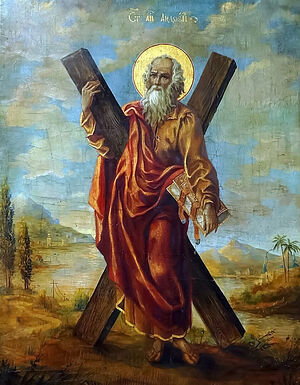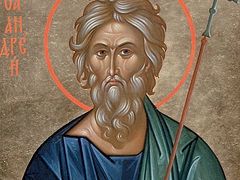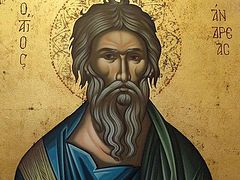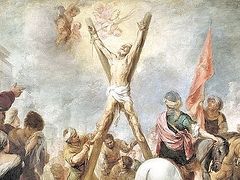 St. Andrew the First-Called The holy Apostle Andrew was first a disciple of St. John the Forerunner. He learned much from the Forerunner, but the most important thing for him was revealed when his teacher met Christ. Behold the Lamb of God, the Forerunner said to his closest followers. We see the greatest of those born among women pointing not to himself, but to the Truth. He well understood that his disciples would leave him for this new, great Teacher. But he came not to draw men to himself, but to Christ. We know how difficult it can be to voluntarily choose second place to someone who has always been first. But as soon as Christ appeared, the Forerunner had no other thought but to direct everyone to Him.
St. Andrew the First-Called The holy Apostle Andrew was first a disciple of St. John the Forerunner. He learned much from the Forerunner, but the most important thing for him was revealed when his teacher met Christ. Behold the Lamb of God, the Forerunner said to his closest followers. We see the greatest of those born among women pointing not to himself, but to the Truth. He well understood that his disciples would leave him for this new, great Teacher. But he came not to draw men to himself, but to Christ. We know how difficult it can be to voluntarily choose second place to someone who has always been first. But as soon as Christ appeared, the Forerunner had no other thought but to direct everyone to Him.
And then, after Christ called St. Andrew, he finds his brother Simon. St. Andrew is already characterized in the Gospel here as a man who’s ready to take second place. He is everywhere referred to as the brother of Simon Peter. People might not have known who Andrew was, but everyone knew Peter. And when it came to Andrew, he was referred to as the brother of Peter. Andrew wasn’t among those who belonged to the inner circle of the Lord’s disciples. When Christ resurrected Jairus’ daughter, when He ascended the mount of Transfiguration, when He went through the temptation in Gethsemane, He took with Him Peter, James, and John. It’d be so easy for Andrew to be wounded by this! Wasn’t he the first-called, one of the first two disciples who followed Christ? Wasn’t Peter indebted to him for his own encounter with Christ? Couldn’t he justifiably have expected to be given one of the first places among the Apostles? But it wasn’t given to him. And he was glad to remain behind when his brother was at the center of all these events. He was quite satisfied with the modest role allotted to him among the Twelve. For St. Andrew, the question of primacy, place, and honor had absolutely no meaning.
The only thing that mattered to him was to be with the Lord and to serve Him however he could. What seek ye? Christ asked when He first met him and the other disciple that was with him. They asked Him: Where dwellest Thou? and He replied: Come and see. And they went and saw where He lived (Jn. 1:38-39). Wherever Christ is, it’s good to be with Him.
For his humility, the Apostle Andrew is granted an exceptional gift of service. He stands before us, first of all, as a man who leads others to Christ. In the Gospels, only thrice is he at the center of attention. The first time is when he brings Peter to Christ. Then when he brings the boy with five loaves and two fish to Christ. And finally, when he brings some Greeks to Christ. It was a great joy for the Apostle Andrew to lead others to the Lord. His sole desire was to share with others the glory of which he was granted to partake. Having found communion with the Lord, he devoted his entire life to leading others to this communion.
We know from the Life of the Apostle how he responded to the threats of the pagan authorities to crucify him for preaching: “If I feared the cross, I wouldn’t preach it.” And, being crucified, he continued to preach the Cross and Resurrection, leading many to faith. The Apostle Andrew the First-Called is a great example of the fact that a Christian can’t keep the gift of God to himself.
Such is the law of holiness. Thus, Philip brings Nathanael to Christ. Thus, the Apostle Paul, having heard from Agrippa at his trial: Almost thou persuadest me to be a Christian, replied: I would to God, that not only thou, but also all that hear me this day, were both almost, and altogether such as I am, except these bonds (Acts 26:28-29). He also testifies with his conscience in the Holy Spirit of his great sorrow and the incessant torment of his heart for his kinsmen who don’t believe in Christ. He’s prepared to be excommunicated from Christ himself; that is, to go to hell for his kinsmen according to the flesh (Rom. 9:1-3). Thus, St. Seraphim of Sarov, who stood for fidelity to the purity of Orthodoxy all his life, even unto the shedding of blood, was ready to endure eternal torments for bishops who had departed from the purity of Orthodoxy, if such a thing were possible. Thus, St. Silouan the Athonite, constantly reflecting upon the harvest of the Last Judgment, would stretch forth his hands in prayer with tears, as if gathering all.
The holy Apostle Andrew is the enlightener of Byzantium. According to Church Tradition, he also walked the land where the city of Kiev would be erected many centuries later, blessing it with a cross and foretelling its glorious future. The last of those to be baptized will be the first in the fruits of holiness, especially in the feat of martyrdom. The Apostle Andrew is the holy patron of all who humbly and faithfully, and without any envy, don’t take the first place. Why will the saints rejoice in the Holy Spirit in the future life seeing others as greater than themselves? Because before rejoicing with those who rejoice, they learned what it means to weep with those who weep; because to rejoice with the rejoicing means to fulfill that commandment of Christ that includes all His commandments within itself: Learn of Me; for I am meek and lowly in heart (Mt. 11:29). It means to become a lasting communicant of the eternal joy of Christ’s Pascha.



